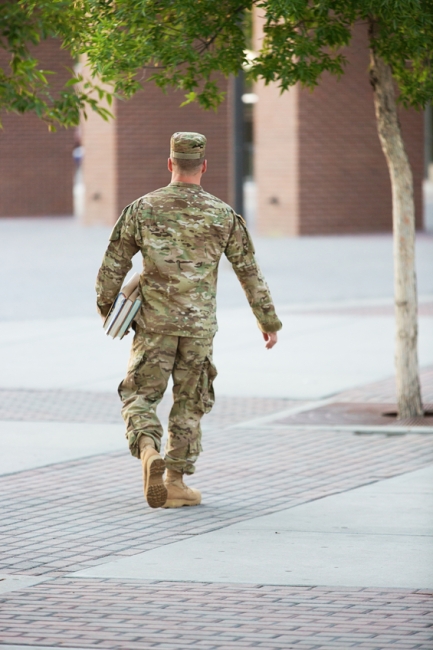You have /5 articles left.
Sign up for a free account or log in.

iStock/Mie Ahmt
I’ll call him Robert Goltamer. He’s an Iraq War sergeant still recovering from wounds sustained in ground combat. Despite regular appointments with the Veterans Affairs hospital, Robert carries heavy muscles and tattoos that disguise his injuries. At first glance, one might assume he could slam James Bond into the emergency room without breaking a sweat. One might also be surprised to find him in the front row of a first-year basic writing class. My class.
After I suppressed my initial fear of his appearance, and after he revealed his military background during classroom introductions, Robert struck me a sincere man, tinged with PTSD and sensitive to his struggles in resuming civilian life and his position as an older student in a room filled mostly with last spring’s high school graduates. I felt drawn to him because, as a veteran myself, I understood some of what he had been through without words. But I worried. The other nine students looked frail next to Robert, and how would the man hold up in college? What if he cracked and tried to killed us all with his bare hands? My best senior-citizen punch would hardly distract him.
As Robert exited for a smoke during our break, I decided to evaluate the risk. I approached him, thanked him for his service and said, “It’s good to meet you. I am a Vietnam Era vet.” He smiled with his entire body. We shook hands as colleagues from the military and as teacher and student in the classroom. He offered me a cigarette, which I declined, but Robert immediately became my primary educational enterprise. Risk assessment: zero.
His wife bore their first child during the semester, and Robert beamed the joys of a new father, becoming more determined to succeed in college, overcome his physical and psychological injuries and provide for a family. This would not be easy. His academic preparedness was marginal, and physical prowess could not write an effective essay.
Robert had been an extreme soldier, so skilled with a rifle that the Iraqis called him Satan. When Robert revealed that nickname to the class, he tendered no apology. I imagined scenes from Saving Private Ryan or Platoon; I heard bullets and bombs; I thought about actions involved in earning such a moniker.
Yet Satan remained my favorite student, a nice guy who studied hard but was clearly affected by war. Perhaps his gentle comportment -- Robert sometimes used words like “cute” or “sweet” when commenting about other students’ essays -- disguised those effects to almost everyone. The young freshmen seemed unaware, perhaps along with many of Robert’s professors. Yet I cringed internally on his behalf, seething at the practice of war. Satan entered my soul and stirred sulfurous memories, for I had witnessed the results of combat while stationed briefly at Travis Air Force Base and during my own recovery at the Veterans Affairs hospital in Long Beach, Calif. One man, 19 years old (my age at the time), lost both arms at the shoulder and both legs near the hip. His torso had been burned; oddly, his face bore no scars and was hopelessly handsome. My first thought when I saw him: “Without hands, how will the poor guy commit suicide?”
Robert and I had conversations, too, sharing edited versions of our military experiences. I told myself that I withheld details of the missile base because they remained classified, but I think there were unconscious fears that university students might still throw bottles or cans at me and yell, “Baby killer!” Robert held back information because, he said, “I don’t want you to think less of me.” He apologized for society’s treatment of Vietnam veterans. I apologized for the IED that ended his military career.
Many words remain unspoken. We somehow know what not to say. Besides, my primary goal wasn’t and isn’t to analyze Robert but to help him with writing and communication, providing extra care with his work. I read one paper outside his regular assignments that wasn’t, he said, “appropriate for the class.” I agreed. Comma splices, run-ons and fragments did nothing to soften the revelations.
Robert and I share a pride in our military service that contrasts with some of its lingering consequences, and I worked merely in a support position for the U.S. Air Force. Sure, I scored sharpshooter with an M-16 at basic training, centering 60 of 60 “fatal” shots in a black silhouette, but I never pointed the weapon at a person. I suspect that Robert sent more bullets toward flesh than I did my target, and I never asked him about the count. The Iraqis didn’t call him Satan for themed body art.
I like to pretend that my military service was clean. After all, in the now disassembled Strategic Air Command, “peace was our profession,” and those nuclear weapons never left their silos. If they had, I wouldn’t have been the one to squeeze the trigger. Robert doesn’t have such a luxury. Bloodletting is too personal.
I officially taught Robert Goltamer for one semester. He is a caring man, husband and father, and I hope, for his sake, that he ranks core decency over the hell of warfare -- a hell often created by those far from the carnage. Besides, Robert reminded me that 44 years have passed since students threw anything at my uniform or yelled, “Baby killer!” Times change.
Satan is a myth, a sworn professional and the mind-set I want beside me in combat. I believe that a college education can heal some of his psychological wounds, as it did mine. Further, as one veteran to another, I try to forgive the demon in all of us. We were assigned hard tasks in hard times, and there’s no magnanimous way to kill a man.




